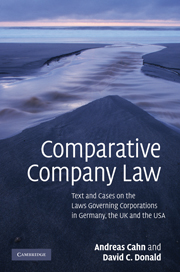 Comparative Company Law
Comparative Company Law Book contents
- Frontmatter
- Contents
- List of figures
- List of tables
- Preface and acknowledgments
- Glossary
- List of abbreviations
- Table of cases
- Table of legislation
- PART I The essential qualities of the corporation
- PART II The corporation and its capital
- PART III Governing the corporation
- SUBPART A The management
- 10 An introduction to the board and its governance
- 11 Directors' power to represent the company
- 12 Directors' duties of loyalty, good faith and care
- 13 Judicial review of management decisions (the business judgment rule)
- 14 Executive compensation
- 15 Directors' duties in listed companies
- SUBPART B The members
- PART IV Corporate combinations, groups and takeovers
- References
- Index
11 - Directors' power to represent the company
from SUBPART A - The management
- Frontmatter
- Contents
- List of figures
- List of tables
- Preface and acknowledgments
- Glossary
- List of abbreviations
- Table of cases
- Table of legislation
- PART I The essential qualities of the corporation
- PART II The corporation and its capital
- PART III Governing the corporation
- SUBPART A The management
- 10 An introduction to the board and its governance
- 11 Directors' power to represent the company
- 12 Directors' duties of loyalty, good faith and care
- 13 Judicial review of management decisions (the business judgment rule)
- 14 Executive compensation
- 15 Directors' duties in listed companies
- SUBPART B The members
- PART IV Corporate combinations, groups and takeovers
- References
- Index
Summary
Required reading
EU: First Company Law Directive, art. 9
D: AktG, §§ 37(3), 39(1), 78, 81, 82, 112, 246(2)
UK: CA 2006, secs. 39–41, 43–48, 270–271, 273, 275, 280
US: DGCL, §§ 122(3), 141(a), (c), 142
Capacity, authority and reliance in contracting
This chapter addresses one of the “topical” areas of law discussed in Chapter 1 that are not formally “company law,” but are nevertheless integral to the operations of the company. All corporations enter into contracts with third parties, beginning with the purchase or lease of their means of production and ending with the sale of their goods or services. These relationships are governed by contract law, not corporate law, and whether the person purporting to act for the corporation can bind it when entering into such contracts is primarily a matter of the law of agency.
Three concepts are central to this topic: capacity, authority and good faith reliance. If a five-year-old child were to appoint a neighbor to the position of chief negotiator with her parents regarding all future “disciplinary proceedings,” the grant of authority may be formally valid, but it would nevertheless be without effect because the child does not have capacity to make it. Corporations have much in common with small children, as they can do nothing on their own. Companies depend fully on the agency of humans and have only the capacity that the law and their constitutional documents give them.
- Type
- Chapter
- Information
- Comparative Company LawText and Cases on the Laws Governing Corporations in Germany, the UK and the USA, pp. 312 - 331Publisher: Cambridge University PressPrint publication year: 2010


